What is literature
what is literature

What is Literature?
• 3. Literature is any kind of writing which for some reason or another somebody values highly.
——Terry Eagleton, Literary Theory: An Introduction
•
4. Literature is “full, central, immediate human experience”, usually with an associated reference to “minute particulars”, consists in the “concrete achievements of many particular great works”. 5. Literature is actually “the process and the result of formal composition within the social and formal properties of a language.”
What is Literature?
September 20
What is Literature?
There have been several attempts to define it, but all of them are problematic: • 1. “imaginative writing in the sense of fiction——writing which is not literary true. • 2. Literature is a kind of writing which represents an “organized violence commited on ordinary speech” (Russian critic Roman Jakobson), which transforms and intensifies ordinary language, deviates systematically from everyday speech, and deforms, defamiliarizes or estranges ordinary language in various ways.
What Is Literature

• 文学是我们生存的一部分。 • 文学的存在先于文学的本质。 • 文学从根本上说是一种物质现实 ,一种社会 活动 ,一种 “话语实践” 。
总结
• 一 ,作为文学的客观本质属性和特征的文学 性; • 二 ,作为人的一种存在方式的文学性。 • 没有一个抽象的、 永恒的、 客观的文学性 , 只有具体的、 历史的、 实践中的文学性。
• 辅助教材:《英国文学名篇选注》,王佐 良等主编,商务印书馆,1999。
考核方式
• • • • Attendance 10% Classroom Performance 20% Reading Notes 30% Term Paper 40%
文学性
Literariness
何谓文学?
文学在比较中存在 文学在差异中存在
文学导读
于洋
课程内容
• 文学理论导读+文学作品赏析 • 文学理论: 专业化 • 掌握与文学相关的基本概念, • 知晓文学理论的流派,文学理论大师的名字 • • • • 文学作品:鉴赏力 体会各文学题材之特色 辅助理解文学理论 掌握文学分析的基本方法
教、学方式
• • • • • • • • 以月为单位 每月第一周:文学理论 第二周:影音娱乐 第三、四、五周:文学作品赏析 3月:诗歌 4月:散文 5月:小说 6月:戏剧
作为一种话语实践的文学语言
• • • • • 话语和语言:parole vs. language 话语:实践中的语言 指鹿为马:强弱关系的符号 语言是一种行为 ,一种行动 。 语言是一种社会实践。
梵﹒高 《农民鞋》
• “从农鞋磨损的内部那黑洞洞的敞口中,劳动者艰 辛的步履显示出来。这硬邦邦的、沉甸甸的破旧 农鞋里,聚集着她在寒风料峭中迈动在一望无际 永远单调的田垄上步履的坚韧与滞缓。……夜幕 降临,这双鞋底在田野小径上踽踽而行。在这鞋 具里 ,回响着大地无声的召唤 ,显示着大地对成熟 的谷物的宁静的馈赠 ,表征着大地在冬闲的荒芜田 野里朦胧的冬冥。这器具聚集着对面包稳固性无 怨无艾的焦虑,以及那再次战胜了贫穷的无言的 喜悦,隐含着分娩时阵痛的哆嗦和死亡逼近时的 战栗。”(海德格尔 《艺术作品的本源》)
西方文学导论期末考试

Warm-up Questions●What is literature?Literature, in a broad sense, means compositions that tell stories, dramatize situations, express emotions, and analyze and advocate ideas.●What are the functions of literature? Why should we study literature?Nourishing emotional life;Obtaining necessary information;Escaping from reality;Obtaining aesthetic pleasure;Improving ourselves;Entertaining ourselves.●What are the major genres of literature?fiction---poetry---drama---nonfiction●What are the four elements of literature?universe---writer---reader---literary textsEssay:By definition, an essay is an organized, connected, and fully developed set of paragraphs that expand on a central idea or central argument. It may include book report, book review, critical essay, theoretical essay, etc.Thesis Sentence:A thesis sentence is an organizing sentence that contains the major topics you plan to treat in your essay.Topic Sentence:A topic sentence is a statement about how a topic supports the argument contained or implied in the central idea.How to read literary works?1)Respond to the works2)Understand the meaning of the text3)Trace the ideas4)Articulate your emotional response to what interests you in the text (characters,problems) relying on your past reading experience.How to write a literary essay?1)Select a topic ---research for the possibility---collecting materials---selecting materials---close-reading& taking notes2)writing drafts ---take a break---revising draftsHow to select a topic?●On a particular work/author●On a particular subject●On comparison/contrast1) an idea or quality common to two or more authors;2) different critical views of a particular work3) the influence of an idea, author, philosophy, political situation, artistic movement onspecific works of an author or authors.4) the origin of a particular work.How to write drafts?Focus on ideasCreate a thesis sentenceShow a process of thoughtKeep to your pointDistinguish your thoughts from othersNever just retell the story or summarize the workCritical reading of critical writingsThesis statement/Thesis sentenceResearch summaryRaising questionsArgumentsDevelopment of argumentsEvidence, Proof, Illustration, etc.Critical approaches:According to four elements of literature, critical approaches for study of literature can be: 1) Text-oriented approaches(literary writings should be the focus of criticism, such as New Criticism, Structuralism, Formalism )2)Author-oriented approaches(Image/imagination as the representation of writer, such as Romanticism; or as the author’s mind/psyche, such as psychoanalysis, expressionism)3)Reader-oriented approaches(reader as important role in criticism, such as Reader-response Criticism, Reception Theory接受理论, Hermeneutics解释学)4)Context-oriented approaches(literature as limitation of universe or reflection of reality such as Realism, NewHistoricism, Femininism, Post-colonialism)Fiction:Fiction refers to an imaginative form of narrative, which mainly includes novels, short stories, fables, fairy tales,etc. Fiction has three main elements: plotting, character, and setting.Story:An account or recital of an event or a series of events, which is fictitious.Structure:●The way a story is assembled;●Straightforward sequential order, description of plot identical to that of structure;●Out-of-sequence, separated episodes, speeches, secondhand reports, remembrances,accidental discoveries, dreams, nightmares, periods of delirium, fragments of letters, overheard conversations, and so on;●Structure of stories: arrangement and development of the stories as they unfold, part bypart.Plot:●Selecting, ordering, arranging of incidents to suggest their importance and theirrelationships, their actual dependence on one another;●Something about the connections between the events it relates;●Traditional polt: exposition, complication, crisis, denouement.Exposition:●Background information(time, setting, details about the characters) for the subsequentconflict;●At the beginning of a story or when the author slowly reveals bits of concernedComplication:●When characters are caught up in their situation and the conflict intensifies;● A good arrangement of complication will coax readers into reading the story.Climax/Crisis:●When conflict reaches its highest point or when the point of greatest intensity appearswhen the opposing forces interlock or reach a standstill;●Turning point of the narrative when the conflict peaks so that the conflict should becoped with and the problem should be solved.Resolution/Denouement:●When conflict between the opposing forces is settled;●In a unified piece of fiction the conflict is not settled by accident but rather by thefulfillment of the basic problem set up during the complication.Conflict:●Struggle between opposing force, which determines and shapes overall organization ofa particular narrative;●Conflict animates characters and events;●Conflict makes the story move;●Traditional plot presents conflict in a rising and a falling patten, with the conclusionlogically growing out of the preceding events;●Modern fiction concentrates more on describing and exploring the intricacies andimplications of the conflict itself.Plot Analysis:●Exposition: A boy of ten years old under the care of his guardian;●Complication: The boy hates Mrs. De Ropp, who dislikes him;●Conflict: The boy’s struggle for freedom from restriction and the woman’s enjoymentof domination;●Crisis: The boy’s praying for the killing and his anxious waiting for something takingplace;●Denouement: It is implied that the woman is killed as the boy wishes and the boyenjoys his eating. The conflict is solved with an accident.Setting:Setting refers not only to the physical location and to the specific time or period in which the action takes place but also to the psychological and the social environment.●helps explain and clarify action and character; helps convey meaning,●functions to establish the credibility of the story,●explains behavior, knowing something about characters’ background●may be taken as symbols or used in the creation fo atmosphere and mood“The Old Chief Mshlanga”●The landscape in 2nd paragraph is out of girl’s imagination which shows her fear,●The landscape of her farm symbolizes ruins done by white colonization,●The description of landscape help understand behavior of the girl.Aspects of Drama:Verbal: 1. Monologue (long, uninterrupted speech addressed to other characters on stage)2. Soliloquy (speaking inner thoughts while alone on stage)3. Dialogue (speech exchanged between two or more characters)4. Stage directions.Nonverbal: 1. (Performance of ) Actions2. Costumes3. Setting4. Music5. LightTragedy: Tragedy is drama in which a major character undergoes a loss but also achieves illumination or a new perspective. It is considered the most concentrates on cosmic implications of its major character’s misfortunes. According to Aristotle, a tragedy is serious (noble, elevated), complete (logical, of whole), and of a certain magnitude (balance of length and subject matter).Aristotle’s Principles:●Consisting in six parts---plot, character, diction, thought, spectacle, song;●An imitation of an action that is serious, complete, and of a certain magnitude, whichexcite pity and fear;●Artistic ornament in language;Comedy:●Comedy is an imitation of characters of a lower type, not, however, in the full sense ofthe word bad. It consists in some defect or ugliness which is not painful or destructive.●Dramatic Irony: Eliciting laughter by audience’s knowledge of disparity between whata character believes to be occurring and what is actually taking place white thecharacter remains ignorant of it;●Verbal Irony: Saying one thing and meaning quite another.Elements of Comedy:●Having light/amusing characters or “character in lower type” (Aristotle);●Using devices of humor, satire, irony, etc;●Containing amusing/funny plots;●Consisting in some defects/ ugliness which is not painful/ destructive(Aristotle)●Having a happy ending.Types of Comedy:●Satiric comedy: Foibles/ folly of human nature exaggerated and cruelly exposed ordisplayed;●Romantic comedy: Gently dealing with human weakness.。
What Is Literature(1)
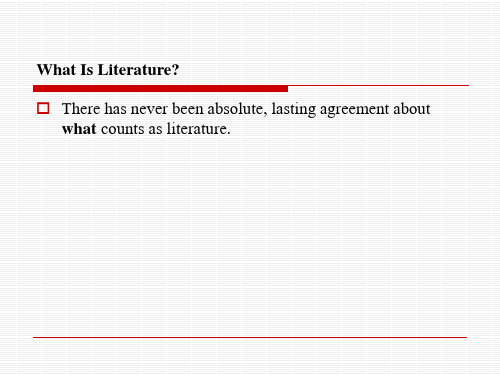
after World War I, as a revolt against conventional realism, a trend far more avant-garde called high modernism(modernist , adj.) came to the literary scene; the so-called literary avant-gardists like T. S. Eliot, William Faulkner, James Joyce and Virginia Woolf, subvert the basic conventions of earlier prose fiction by breaking up the narrative continuity, departing from the standard ways of representing characters, and violating the traditional syntax and coherence of narrative language by the use of streamof-consciousness(a mode of narration in modern fiction that describes, without an narrator’s intervention, the unbroken flow of perceptions, thoughts, and feelings in the waking mind.) and other innovative modes of narraof Imagination Classification of fiction:
What is literatere

What is “literature”?1) Literature is broadly defined as any written or spoken material, but the term most often refers to creative works, which are of artistic value. Literature includes poetry, drama, fiction, and many kinds of nonfiction writing, as well as oral, dramatic, and broadcast compositions not necessarily preserved in a written format, such as films and television programs.2) Literature is the expression of life in words of truth and beauty; it is the written record of man’s spirit, of his thoughts, emotions and aspirations; it is the history and the only history of human soul. It is characterized by its artistic, suggestive and permanent qualities.What is English literature?Literature produced in England, from the introduction of Old English by the Anglo-Saxons in the 5th century to the present. The works of those Irish and Scottish authors who are closely identified with English life and letters are also considered part of English literature.Why do we study literature?To improve and develop our understanding and use of the language through reading and discussion of the literary texts;◈To awaken our appreciative and critical faculties and so encourage our development as readers of literature, aside from the pleasure of reading, of entering into a new world and having our imagination quickened;◈To know Man as well as ourselves. (Man is ever a dual creature; he has an outward and inward nature; he is not only a doer of deeds, but a dreamer of dreams. Every great act springs from an ideal.How shall we learn this course?Collaborative exploration through lectures,discussion, presentations, seminars, on thebasis of individual reading, meditation,reflection and understanding, as well aspersonal experiences in literature reading3.RequirementsSome DOs。
What is literature 什么是文学 ppt课件
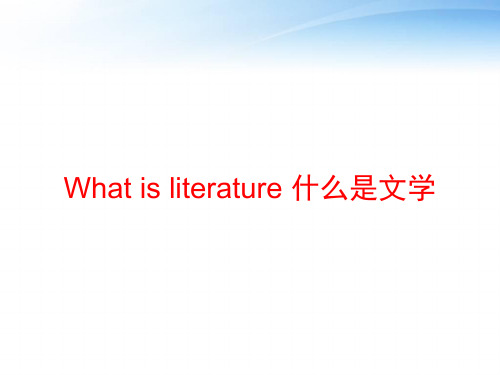
literature prevailed in the early and
mid-20th century among AngloAmerican New Critics, many of whom are represented in my lecture.
And Poe concludes that “ the death of a beautiful woman is, unquestionably, the most poetical topic in the world.” Poe is opposed to “the heresy of the didactic” and calls for “pure” poetry. What he seems to be saying is that art does not lie in its message; poetry does not have to inculcate a moral; the artistry of the poem lies not so much in what is being said as in the way it says it.
比如说,英美新批评注重文学性语言和有机整体性, 洛 伊丝·泰森如是说:
在新批评看来,文学文本形式因素的重要性源于文学性语 言迥异于科学性语言和日常语言的特质。科学性语言及很大 一部分日常语言依赖语词的指称意义(本义),即单词和它 所表征的客体及概念之间的一一对应关系。科学性语言不优 美,不煽情,不试图引人注目。它的使命不是自我指涉,而 是指称它试图描述与解释的语言外物质世界。与此形成对比 的是,文学性语言依赖语词的内涵意义:隐含意义、联想意 义、暗示意义、引申意义和细微意义(比如说“父亲”这个词 的本义指双亲中的男性,内涵意义泛指权威、庇护和责任感 )。此外,文学性语言富于表现力:它传达语调、态度和情 感。虽然日常语言也富于表现力且内涵意义丰富,一般来说 却并非常常有意而为之,因为它的主要目的是实用性的。日 常语言旨在完成交际使命。文学性语言将语言资源组合成一 特殊复杂统一体,其目的在于确立一个自足的引发审美体验 的世界。
What is literature 什么是文学 ppt课件

The theory first emerged during the 19th century when poets such as Edgar Allan Poe and Gerard Manley Hopkins started exploring, sometimes, extravagantly, the constituent materials of literature (especially sound effects), turning away from the notion of literature as simply a reliable recorder of nature or source of morality.
In our ordinary understanding, literature represents life; it holds up, as it were, a mirror to nature and is thus “mimetic.” The expressive theory of literature, which regards literature as stemming from the author’s inner being, similarly depends on a notion of mirroring, though here literature reflects the inner soul rather than the external world of the writer.
The didactic theory, which sees literature as a source of knowledge, insight, wisdom, and perhaps prophecy, is compatible with both the mimetic and expressive theory: literature can depict external and internal realities while at the same time disseminating valuable knowledge and clarifying emotions.
what is literature -文学意义

• --read aesthetically • --intended by the author to be read aesthetically • --contain many weak applicatures (deliberately open in interpretation) Jim Meyer (1997) Meyer, Jim. 1997. "What is literature? A definition based on prototypes." Work Papers of the Summer Institute of Linguistics, University of North Dakota 41: [33-42].
The Anglo-Saxon period (449-1066)
• 1. historical background • Three conquests: Roman conquest in 43 AD; Anglo-Saxon conquest in 449; Norman conquest in 1066 • 43 AD, Roman conquered Britain ,making the latter a province of Roman Empire; the withdrawal of Roman troops ,the Teutonic tribes, esp., the Anglos conquered the island and called it Angle-land, then England, their language is Anglo-Saxon old English.
• Whatever critical paradigm (批评的范 式/样式) we use to discuss and analyze literature, there is still an artistic quality to the works. Literature is important to us because it speaks to us, it is universal, and it affects us. Even when it is ugly, literature is beautiful. 3
2011 Week 1 What is Literature
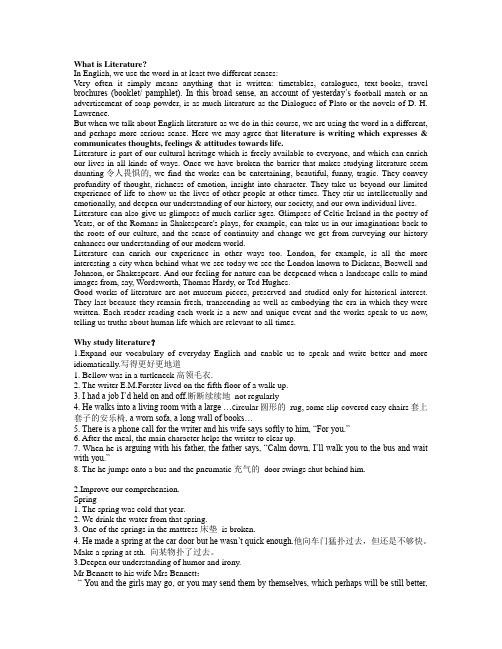
What is Literature?In English, we use the word in at least two different senses:Very often it simply means anything that is written: timetables, catalogues, text-books, travel brochures (booklet/ pamphlet). In this broad sense, an account of yesterday’s football match or an advertisement of soap powder, is as much literature as the Dialogues of Plato or the novels of D. H. Lawrence.But when we talk about English literature as we do in this course, we are using the word in a different, and perhaps more serious sense. Here we may agree that literature is writing which expresses & communicates thoughts, feelings & attitudes towards life.Literature is part of our cultural heritage which is freely available to everyone, and which can enrich our lives in all kinds of ways. Once we have broken the barrier that makes studying literature seem daunting令人畏惧的, we find the works can be entertaining, beautiful, funny, tragic. They convey profundity of thought, richness of emotion, insight into character. They take us beyond our limited experience of life to show us the lives of other people at other times. They stir us intellectually and emotionally, and deepen our understanding of our history, our society, and our own individual lives. Literature can also give us glimpses of much earlier ages. Glimpses of Celtic Ireland in the poetry of Yeats, or of the Romans in Shakespeare's plays, for example, can take us in our imaginations back to the roots of our culture, and the sense of continuity and change we get from surveying our history enhances our understanding of our modern world.Literature can enrich our experience in other ways too. London, for example, is all the more interesting a city when behind what we see today we see the London known to Dickens, Boswell and Johnson, or Shakespeare. And our feeling for nature can be deepened when a landscape calls to mind images from, say, Wordsworth, Thomas Hardy, or Ted Hughes.Good works of literature are not museum pieces, preserved and studied only for historical interest. They last because they remain fresh, transcending as well as embodying the era in which they were written. Each reader reading each work is a new and unique event and the works speak to us now, telling us truths about human life which are relevant to all times.Why study literature?1.Expand our vocabulary of everyday English and enable us to speak and write better and more idiomatically.写得更好更地道1. Bellow was in a turtleneck高领毛衣.2. The writer E.M.Forster lived on the fifth floor of a walk-up.3. I had a job I’d held on and off.断断续续地not regularly4. He walks into a living room with a large …c ircular圆形的rug, some slip-covered easy chairs套上套子的安乐椅, a worn sofa, a long wall of books…5. There is a phone call for the writer and his wife says softly to him, “For you.”6. After the meal, the main character helps the writer to clear up.7. When he i s arguing with his father, the father says, “Calm down, I’ll walk you to the bus and wait with you.”8. The he jumps onto a bus and the pneumatic充气的door swings shut behind him.2.Improve our comprehension.Spring1. The spring was cold that year.2. We drink the water from that spring.3. One of the springs in the mattress床垫is broken.4. He made a spring at the car door but he wasn’t quick enough.他向车门猛扑过去,但还是不够快。
Whatisliterature

Whatisliterature第一篇:What is literatureGenerally, most people have their own ideas of what literature is.When enrolling in a literary course at university, you expect that everything on the reading list will be“literature”.Similarly, you might expect everything by a known author to be literature, even though the quality of that author's work may vary from publication to publication.Perhaps you get an idea just from looking at the cover design on a book whether it is “literary” or “pulp”.Literature then, is a form of demarcation, however fuzzy, based on the premise that all texts are not created equal.Some have or are given more value than others.Etymologically, literature has to do with letters, the written as opposed to the spoken word, though not everything that is written down is literature.As a classification, it doesn't really have any firm boundary lines.There is recurring agreement amongst theorists though that for a work to be called literature must display excellence in form and style.Something may also be literary by association – that is, because V.S.Naipaul is a literary figure through his novels, his private letters are passed as literature as well.The common definition of literature, particularly for university courses, is that it covers the major genres of poetry, drama, and novel/fiction.The term also implies literary quality and distinction.This is a fairly basic view of literature because, as mentioned in theintroduction, the meaning of the term has undergone changes, and will no doubt continue to do so.Most contemporary literary histories show a shift from the belles-lettres tradition, which was concerned with finding beauty, anelevated use of language, emotional effects and moral sentiments before something could be called literature.The three main ways of approaching a definition of literature are relativism, subjectivism and agnosticism.With relativism, there are no value distinctions in literature;anything may be called good literature.Subjectivism, as the term implies, means that all theories of literary value are subjective, and that literary evaluation is a purely personal matter.Agnosticism follows from subjectivism, though it argues that though there may be real distinctions in literary value, our subjective value systems prevent us from knowing anything about the real values.Definitions of literature change because they describe and clarify a reality, they do not create the reality they describe.Or it may be that definitions tell us what we ought to think literature should be.At a dinner party you would be swiftly corrected if you referred to Mills & Boon as literature.This might occur for two reasons: the common perception ofliterature as described by current definitions doesn't include mass-market romance novels;or Mills & Boon might well be literature, but contemporary definitions tell us it shouldn't be.The reason why we learn literature is that it is useful to look at some of the things that literature does.Literature is something that reflects society, makes us think aboutourselves and our society, allows us to enjoy language and beauty, it can be didactic, and it reflects on “the human condition”.It both reflects ideology and changes ideology, just like it follows generic conventions as well as changing them.It has social and political effects.Literature is the creation of another world, a world that we can only see through reading literature.。
English_literature_I简介和古英语时期英国文学

❖ Generally speaking, all that is best in a language finds expression in its literature. Dictionaries tell us about the spellings, pronunciations & definitions of words. The commonest way to learn the meaning of a word is to look it up in a dictionary. But dictionaries cannot show all the subtle shades of meaning of a word. The best way to study the meaning of a word is that of learning it between the lines in the works of major writers. For an intimate understanding of the language , we need to read literary works and to think about what we read.
What Is Literature
❖ Literature is a permanent expression in words of some thoughts or feelings or ideas about life & the world.
Literary genres
❖ Narrative, lyric, dramatic ❖ Poetry, prose, drama, fiction
what is literature

Longman Dictionary of Contemporary English (2003):
Books, plays, poems etc that people think are important and good 文学(作品)
The English-Chinese Dictionary (Unabridged) (1993):
--read aesthetically --intended by the author to be read
aesthetically --contain many weak applicatures
(deliberately open in interpretation) Jim Meyer (1997)
Literature is a term used to describe written or spoken material. Broadly speaking, it is used to describe anything from creative writing to more technical or scientific works, but the term is most commonly used to refer to works of the creative imagination, including works of poetry, drama, fiction, and nonfiction.
The role of literature
赵炎秋:《文学何为?》(《益阳师专学报》2001 年02期)
“讨论文学的作用应有个基本出发点:即这个作 用是文学的本质作用,是文学对人与人类社会 的作用,是人类需要的不可缺少的作用。从这 个角度来看,目前流行的关于文学作用的三种 主要看法,即寓教于乐说、情感说、颠覆语言 说,便存在一定的问题。文学的主要作用有以 下三点:它是人类掌握世界的一种方式;它凝 集人类生活的片断;它是人类本质力量对象化 的一个重要方面。”
What is Literature
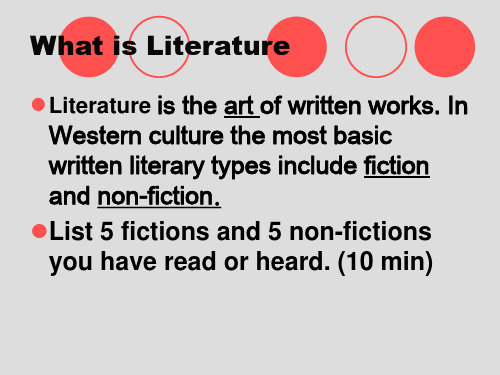
A Brief History of Modern Chinese Literature
Expository writing is a rhetorical mode of writing in which the purpose of the author is to inform, explain, describe, or define his or her subject to the reader. Expository text is meant to ‘expose’ information and is the most frequently used type of writing by students in colleges and universities. A wellwritten exposition remains focused on its topic and listing events in chronological order.
Novel (长篇小说): A work of 50,000 words or more. (about 170+ pages)
Epic (史诗): A work of 200,000 words or more. (about 680+ pages)
What is Literature-Non-Fiction
Categories of Fiction-Types of prose
fiction:
Flash fiction (小小说): A work of fewer than 2,000 words. (1,000 by some definitions) (around 5 pages)
Lecture One--What is Literature

•
D. Some would argue that it is the creation of these elements—how they are used and in what context—that determines whether a piece of writing is literature. E. What literary work may contain is a peculiar aesthetic quality—that is, some element of beauty—that distinguishes it as literature from other forms of writing. F. Still other critics add the test-of-time criterion to their essential components of literature. if a work withstands the passage of time and is still being read centuries after its creation, it is deemed valuable and worthy to be called literature.
•
2. Functions of Literature (2)
• It exercises our emotions through interest, concern, tension, excitement, hope, fear, regret, laughter, and sympathy. Through cumulative experience in reading, great literature shapes our goals and values by helping us clarify our own identities, both positively, through acceptance of the admirable in human beings, and negatively, through rejection of the sinister. It helps us shape our judgments through the comparison of the good and the bad.
什么是文学

什么是文学?What is literature?Literature is language artistically used to achieve identifiable literary qualities and to convey meaningful messages.英语中literacy(读写能力)一词在19世纪末刚刚出现,在此之前,literature(文学) 代替literacy指代一种既能够阅读的能力(读)又能被阅读的能力(写),具备这种能力的人也就是人们通常所说的“有文化”的人。
而我们现在所说的这种“文学”,即由诗歌、小说、戏剧、散文、寓言、讲演等文类(体裁)构成的艺术样式,则始终由“诗歌”来指代。
作为“文学”的这种读写能力从古代出现伊始就具有功利性。
比如,人们担心忘记了做过的事情,就把它刻在岩石上或洞穴的墙上;当人们打了胜仗回来,聚集在篝火周围欢快地唱着、舞着的时候,第一首战争歌曲诞生了;当人们感到某种冲动,要向冥冥中某种超自然的力量表示感激、恐惧、祈福、忏悔等各种情感和内在需求时,祈祷也随之出现了;而当这种祈祷一代一代地接续下去,关于神的故事也便口传下来,古老的神圣经典形成了。
据说基督教《圣经》中记载的大洪水的故事在公元前4000年时就发生了,最初是迦勒底人用“楔形文字”刻在泥匾上的,后来经过多少世纪的铭刻和抄写,才以最后的形式进入《圣经》。
世界上最早的“书”在摩西诞生2000年之前就出现了,比荷马史诗和所罗门的《箴言》还早2500年,比印度的《吠陀经》早2000年,这就是古埃及人写在卷轴上的《卜塔一霍特普的箴言》。
埃及的芦苇、欧洲的牛皮、中国的竹简和丝绸都是用来制作古书的原材料。
当中国的造纸技术和活版印刷(比西方的活版印刷早300年)出现之后,我们才有了现在的纸制书。
但是,即使在古代,也并非所有的书都是“文学”。
古埃及人写了大量的书,但大部分属于宗教、道德、法律、修辞、代数、测量、几何、医学、旅游等,只有少数属于“文学”,而我们上面提到的那本《箴言》却是以小说的形式写成的,或许可以称为世界上最早的一部小说。
L1_what is literature

柏拉图的写作形式与意图 柏拉图的“诗”——对话(戏剧) 对话的两种读法:哲学式与文学式读法 对话的文学形式:时间、地点、人物、情节、 论题等
“苏格拉底对话”——柏拉图的“苏格拉底问题”
阿里斯托芬、色诺芬、柏拉图、亚里斯多德笔 下的苏格拉底 阿里斯托芬的《云》——苏格拉底形象:自然 哲人和智术师(智者)
义:文学,才不过二百年。1800年之前, literature这个词和它在欧洲语言中相似的词指的 是‘著作’或者‘书本知识’。”
英语中literature一词最早出现在14世纪,源于拉 丁文litteratura和littevae。它最初的含义是泛指 一切文本材料而非文学。
Literature
在欧洲,直到18世纪末,文学一词都还只 是文献之意,随后逐渐过渡到专指有关古 典文献的特别知识和研究。 1900年前后形成了现代的文学观念,即专 门指涉具有审美想像性的那一类特殊文本。
(二)中文“文学”的含义
A、文献、文化知识 “文学”一词,首见于《论语·先进》 《论语•先进》:“德行:颜渊、闵子骞、冉伯牛、仲弓。言 语:宰我、子贡。政事:冉有、季路。文学:子游、子夏。” 杨伯峻《论语译注》:文学“指古代文献,即孔子所传的 《诗》《书》《易》等。”实泛指学术文化。 《荀子•大略》:“人之于文学也,犹玉之于琢磨也。”
(《理想国》第六卷268-271)
诗与哲学——谁代表了真理?
《理想国》第10卷——诗的缺陷:
最高的是永恒不变的‚善‛( The (Idea)或‚理式‛(Form);
Good )、‚理念‛
其次才是反映了理式的,自然的或人为的现实世界; 最次的是对第二个的反映,诸如水中和镜中的影象 或艺术之类。
英国文学作品选读1.what is literature

It takes a great deal of history to produce a little literature.- Henry James
精品文档
Literature: quotations
Develop an interest in life as you see it; the people, things, literature, music — the world is so rich, simply throbbing with rich treasures, beautiful souls and interesting people. Forget yourself. — —Henry Miller
精品文档
Literature may consist of texts based on factual information (journalistic or non-fiction), a category that may also include biography and reflective essays, or it may consist of texts based on imagination (such as fiction, poetry, or drama).
A. George Bernard Shaw B. W. B. Yeats C. Dylan Thomas D. T.S. Eliot
精品文档
Which of the following novelists wrote The Sound and the Fury
WHAT IS LITERATURE
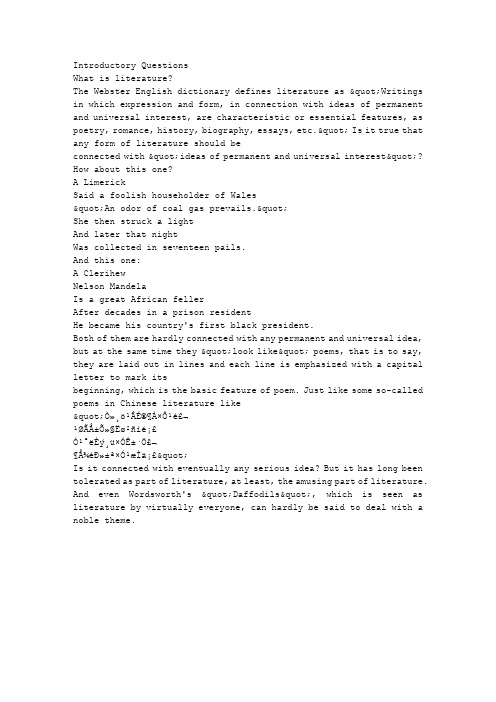
Introductory QuestionsWhat is literature?The Webster English dictionary defines literature as "Writings in which expression and form, in connection with ideas of permanent and universal interest, are characteristic or essential features, as poetry, romance, history, biography, essays, etc." Is it true that any form of literature should beconnected with "ideas of permanent and universal interest"? How about this one?A LimerickSaid a foolish householder of Wales"An odor of coal gas prevails."She then struck a lightAnd later that nightWas collected in seventeen pails.And this one:A ClerihewNelson MandelaIs a great African fellerAfter decades in a prison residentHe became his country's first black president.Both of them are hardly connected with any permanent and universal idea, but at the same time they "look like" poems, that is to say, they are laid out in lines and each line is emphasized with a capital letter to mark itsbeginning, which is the basic feature of poem. Just like some so-called poems in Chinese literature like"Ò»¸ö¹ÂÉ®¶À×Թ飬¹ØÃűջ§Ëø²ñìé¡£Ò¹°ëÈý¸ü×Óʱ·Ö£¬¶Å¾éл±ª×Ó¹æÌä¡£"Is it connected with eventually any serious idea? But it has long been tolerated as part of literature, at least, the amusing part of literature. And even Wordsworth's "Daffodils", which is seen as literature by virtually everyone, can hardly be said to deal with a noble theme.。
- 1、下载文档前请自行甄别文档内容的完整性,平台不提供额外的编辑、内容补充、找答案等附加服务。
- 2、"仅部分预览"的文档,不可在线预览部分如存在完整性等问题,可反馈申请退款(可完整预览的文档不适用该条件!)。
- 3、如文档侵犯您的权益,请联系客服反馈,我们会尽快为您处理(人工客服工作时间:9:00-18:30)。
Introductory Questions
What is literature?
The Webster English dictionary defines literature as "Writings in which
expression and form, in connection with ideas of permanent and universal interest, are characteristic or essential features, as poetry, romance, history,
biography, essays, etc." Is it true that any form of literature should be
connected with "ideas of permanent and universal interest"? How about this one?
A Limerick
Said a foolish householder of Wales
"An odor of coal gas prevails."
She then struck a light
And later that night
Was collected in seventeen pails.
And this one:
A Clerihew
Nelson Mandela
Is a great African feller
After decades in a prison resident
He became his country's first black president.
Both of them are hardly connected with any permanent and universal
idea, but at the same time they "look like" poems, that is to say, they are laid out in lines and each line is emphasized with a capital letter to mark its beginning, which is the basic feature of poem. Just like some so-called poems in Chinese literature like
"一个孤僧独自归,
关门闭户锁柴扉。
夜半三更子时分,
杜鹃谢豹子规啼。
"
Is it connected with eventually any serious idea? But it has long been
tolerated as part of literature, at least, the amusing part of literature. And even Wordsworth's "Daffodils", which is seen as literature by virtually everyone, can hardly be said to deal with a noble theme.
And the Chambers University Learners' Dictionary tells us that "Literature: poems, novels, plays, etc in verse or prose, esp. if of high quality. " This definition also has its flaw, as it is really hard to set down a series of canons to distinguish those of low quality from those of high quality.
While the author of An Introduction to English Stylistics and Rhetoric for Chinese Learners pops the idea that literature is the writing product in literary language. This argument is in itself obviously problematic, as the language of many writers, esp. of some novelists, is hardly literary. For example, Mark Twain in his "The Adventures of Huckleberry Finn" opens his masterpiece with
"You don't know about me, without you have read a book by the name of 'The Adventures of Tom Sawyer', but that ain't no matter. That book was made by Mr. Mark Twain, and he told the truth, mainly. There was things that he stretched, but he mainly told the truth. That is nothing. I never seen anybody but lied, one time or another, without it was Aunt Polly----- Tom's Aunt Polly, she is ----- and Mary, and the widow Douglas is all told about in that book----- which is mostly a true book; with some stretches, as I said before." But it is universally acknowledged as good literature.
What do you expect to learn in this course called English Literature?。
